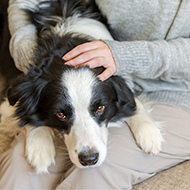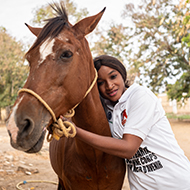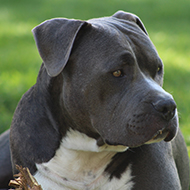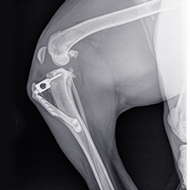Anne McBride spoke at BSAVA Congress.
Dog-related injuries have risen significantly in recent years
During a talk on dog bite prevention at the BSAVA Congress, Anne McBride, a practicing animal behaviour therapist, discussed the importance of educating dog owners about their responsibility for their pets' behaviour.
Anne's lecture outlined why people are bitten by dogs, and the steps that veterinary practices can implement to enable both dog owners and non-owners to prevent incidents.
There has been a significant increase in dog related injuries over the last 10 years - largely due to owners receiving irresponsible advice. Although some of the injuries were caused by biting, many were caused by dogs knocking people over and jumping up at guests - illustrating that dogs do not have to be aggressive to be considered dangerously out of control.
All those involved with the upbringing and training of a dog are responsible for its behaviour, said Anne. However, veterinary professionals are in a particularly good position to educate owners.
But to educate owners, vets must have knowledge of dog behaviour, how dogs learn and how physical factors, such as pain, can affect behaviour. They should also ensure that owners are alerted to the legal implications of dog ownership - explaining what they are, why they exist and the potential outcomes if they do not comply.
During the lecture, Anne pointed out a number of ways that vets can educate their clients:
- Making owners aware of the most basic commands. Come, leave, walk to heal and off lead, sit, down, wait and relax - a dog should be able to carry out all of these commands in a variety of environments.
- Advise owners about what to consider when choosing the right breed for their lifestyle.
- Encourage owners to see and handle the bitch and sire before they purchase a puppy.
- Explain why dogs have teeth (prevention relies on understanding).
- Teach clients to socialise their dogs with a wide range of other dogs and people.
- Display posters in waiting rooms sugesting how owners can prevent accidents (e.g. when dogs start to play in the park, move away from the path to the grass).
- Advise on appropriate leads, appropriate muzzles and appropriate training.
If you do not have the appropriate knowledge, then it is best to refer to somebody who does, stressed Anne. "Give appropriate advice, or refer on!" A good knowledge of local training classes and their methods is good to have in this respect.
For more information about dog bite prevention, visit www.doggonesafe.com







 Birmingham Dogs Home has issued an urgent winter appeal as it faces more challenges over the Christmas period.
Birmingham Dogs Home has issued an urgent winter appeal as it faces more challenges over the Christmas period.
